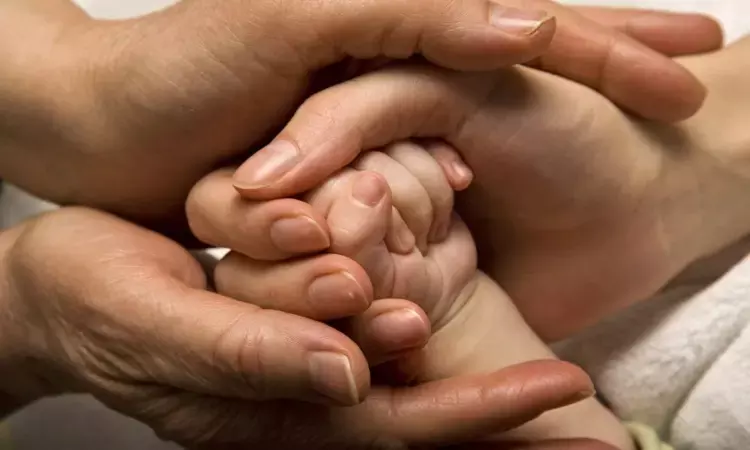- Home
- Medical news & Guidelines
- Anesthesiology
- Cardiology and CTVS
- Critical Care
- Dentistry
- Dermatology
- Diabetes and Endocrinology
- ENT
- Gastroenterology
- Medicine
- Nephrology
- Neurology
- Obstretics-Gynaecology
- Oncology
- Ophthalmology
- Orthopaedics
- Pediatrics-Neonatology
- Psychiatry
- Pulmonology
- Radiology
- Surgery
- Urology
- Laboratory Medicine
- Diet
- Nursing
- Paramedical
- Physiotherapy
- Health news
- Fact Check
- Bone Health Fact Check
- Brain Health Fact Check
- Cancer Related Fact Check
- Child Care Fact Check
- Dental and oral health fact check
- Diabetes and metabolic health fact check
- Diet and Nutrition Fact Check
- Eye and ENT Care Fact Check
- Fitness fact check
- Gut health fact check
- Heart health fact check
- Kidney health fact check
- Medical education fact check
- Men's health fact check
- Respiratory fact check
- Skin and hair care fact check
- Vaccine and Immunization fact check
- Women's health fact check
- AYUSH
- State News
- Andaman and Nicobar Islands
- Andhra Pradesh
- Arunachal Pradesh
- Assam
- Bihar
- Chandigarh
- Chattisgarh
- Dadra and Nagar Haveli
- Daman and Diu
- Delhi
- Goa
- Gujarat
- Haryana
- Himachal Pradesh
- Jammu & Kashmir
- Jharkhand
- Karnataka
- Kerala
- Ladakh
- Lakshadweep
- Madhya Pradesh
- Maharashtra
- Manipur
- Meghalaya
- Mizoram
- Nagaland
- Odisha
- Puducherry
- Punjab
- Rajasthan
- Sikkim
- Tamil Nadu
- Telangana
- Tripura
- Uttar Pradesh
- Uttrakhand
- West Bengal
- Medical Education
- Industry
CBD transdermal gel reduces epileptic seizures in kids with DEEs: JAMA

USA: CBD transdermal gel is safe, well-tolerated, and may reduce epileptic seizures in children with developmental and epileptic encephalopathies (DEEs), a recent study has revealed.
According to the study, published in JAMA Network Open, cannabidiol (CBD) transdermal gel was associated with reductions in focal impaired awareness seizures (FIAS) and tonic-clonic seizures (TCS) frequency and disease burden.
Developmental and epileptic encephalopathies are the most severe group of epilepsies that begin typically in infancy and childhood. They include but are not limited to, many well-known epilepsy syndromes, such as Dravet, Lennox-Gastaut syndrome (LGS), West, and myoclonic-atonic epilepsy.
DEEs are the most severe group of drug-resistant epilepsies. Considering this, there arises an urgent need for alternatives to oral therapies to reduce seizures and improve developmental outcomes and comorbidities in this medically complex population.
Against the above background, Ingrid E. Scheffer, Austin Health and Royal Children's Hospital, Florey Institute, Melbourne, Victoria, Australia, and colleagues aimed to assess the safety and tolerability of CBD transdermal gel in children with DEEs and to evaluate seizure frequency, sleep, and quality of life in a nonrandomized controlled trial conducted in 2 centers in Australia and New Zealand from April 2018 to July 2019.
The study included children and adolescents aged 3 to 18 years with DEEs who were receiving a stable regimen of 1 to 4 antiseizure medications. Following a 1-month baseline and titration periods, patients entered a 5.5-month flexible-dosing maintenance period for a total of 6.5 months of treatment.
The intervention was twice-daily applications of CBD transdermal gel at doses of 125 to 500 mg for 6.5 months.
Safety and tolerability assessments included adverse events (AEs) and examination of the skin. The outcome for seizures was the median percentage change from baseline in monthly (28-day) seizure frequency of FIAS and TCS over 6.5 months.
The study yielded the following findings:
- Of 48 patients (mean age, 10.5 years; 54% boys), 29 60% had at least 1 treatment-related AE over 6.5 months; 44 of 46 treatment-related AEs (96%) were mild or moderate.
- Treatment-related AEs that occurred in at least 5% of patients were application-site dryness, application-site pain, and somnolence (each reported by 4 patients [8%]).
- The only treatment-related gastrointestinal AE was diarrhea, reported in a single patient. CBD treatment was associated with reductions in FIAS and TCS frequency.
- Analysis of the 33 patients with FIAS and TCS showed a median (interquartile range) monthly reduction in seizures of 58% at 5 months and 43.5% over the entire 6.5-month study period.
- Parents and caregivers noted improvements in social or interpersonal engagement and irritability (33 of 43 [77%] participants); alertness, energy, and sleep (23 of 43 [53%]); and cognition or concentration (20 of 43 [47%]).
"The treatment was associated with a reduction in FIAS and TCS frequency, as well as with caregiver-reported improvements in behavior, sleep, cognition, and quality of life," wrote the authors. "These findings highlight the need for a double-masked randomized clinical trial of CBD transdermal gel."
Reference:
The study titled, "Safety and Tolerability of Transdermal Cannabidiol Gel in Children With Developmental and Epileptic Encephalopathies: A Nonrandomized Controlled Trial," is published in JAMA Network Open.
DOI: https://jamanetwork.com/journals/jamanetworkopen/fullarticle/2783716
Dr Kamal Kant Kohli-MBBS, DTCD- a chest specialist with more than 30 years of practice and a flair for writing clinical articles, Dr Kamal Kant Kohli joined Medical Dialogues as a Chief Editor of Medical News. Besides writing articles, as an editor, he proofreads and verifies all the medical content published on Medical Dialogues including those coming from journals, studies,medical conferences,guidelines etc. Email: drkohli@medicaldialogues.in. Contact no. 011-43720751


